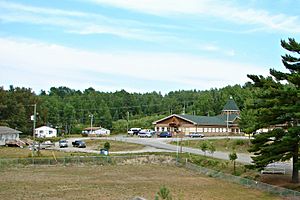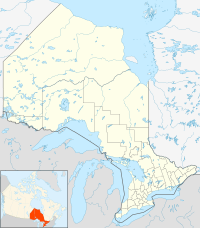Sabaskong Bay 35D facts for kids
Quick facts for kids
Sabaskong Bay 35D
|
|
|---|---|
| Sabaskong Bay Indian Reserve No. 35D | |
 |
|
| Country | |
| Province | |
| District | Kenora |
| First Nation | Ojibways of Onigaming |
| Area | |
| • Land | 5.00 km2 (1.93 sq mi) |
| Population
(2011)
|
|
| • Total | 387 |
| • Density | 77.4/km2 (200/sq mi) |
Sabaskong Bay 35D is a special area of land called a First Nations reserve. It is located in the beautiful province of Ontario, Canada. This reserve is found near Kakagi Lake and the town of Sioux Narrows-Nestor Falls.
Sabaskong Bay 35D is very important. It is the main home for the Ojibways of Onigaming First Nation. This means it's where many members of this First Nation community live.
Contents
Sabaskong Bay 35D: A First Nation Community
Sabaskong Bay 35D is a place where a First Nation community lives. A First Nation is one of the many groups of Indigenous peoples in Canada. They have their own unique cultures and histories.
This reserve is a protected area of land. It is set aside for the use and benefit of the Ojibways of Onigaming First Nation. It helps them keep their traditions alive.
Where is Sabaskong Bay 35D Located?
Sabaskong Bay 35D is in the northwestern part of Ontario. It is close to the shores of Kakagi Lake. This lake is known for its clear waters and many islands.
The reserve is also near the small community of Sioux Narrows-Nestor Falls. This area is popular for outdoor activities. People enjoy fishing, boating, and exploring nature here.
Who Lives at Sabaskong Bay 35D?
The people who live at Sabaskong Bay 35D are members of the Ojibways of Onigaming First Nation. In 2011, about 387 people lived on this reserve.
The land area of the reserve is about 5 square kilometers. This means there are about 77 people living in each square kilometer. It is a close-knit community.
The Ojibways of Onigaming First Nation
The Ojibways of Onigaming are an Ojibwe First Nation. The Ojibwe are one of the largest Indigenous groups in North America. They have a rich history and culture.
They have lived in this region for thousands of years. Their traditions are deeply connected to the land and water. The reserve helps them maintain their way of life.
 | Precious Adams |
 | Lauren Anderson |
 | Janet Collins |


